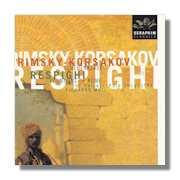
The Internet's Premier Classical Music Source
Related Links
-
Rimksy-Korsakoff Reviews
Respighi Reviews - Latest Reviews
- More Reviews
-
By Composer
-
Collections
DVD & Blu-ray
Books
Concert Reviews
Articles/Interviews
Software
Audio
Search Amazon
Recommended Links
Site News
 CD Review
CD Review
Muti in Philadelphia

- Nicolai Rimksy-Korsakoff: Scheherazade, Op. 35
- Ottorino Respighi: The Fountains of Rome
Philadelphia Orchestra/Riccardo Muti
EMI 73291
Riccardo Muti left a small and not altogether successful discography from his years in Philadelphia. Part of the problem was repertoire selection; Eugene Ormandy also recorded nearly all of the selections that EMI/Angel chose for Muti with the same orchestra over his illustrious career. Part of the problem was timing, because the major labels were in the process of imploding and the advent of CDs flooded the market in a way that few could have predicted. And the third part of the problem was Muti himself. His Philadelphia tenure isn't especially remembered today, and much like Maazel following Szell in Cleveland, or Martinon following Reiner in Chicago, the expectations were too high. This all obscures that Maazel, Martinon, and Muti made some great recordings with their ensembles. Muti was arguably more exciting than Ormandy (and certainly more so than late Ormandy for RCA) and never quite got the credit he deserved. This disc is a fine example.
Despite rather harsh and unappealing sound reproduction, these recordings are stunning. Although Eugene Ormandy left well-regarded, even beloved versions of both works, there's little doubt in my mind that the claim Muti was more exciting applies here. His "Roman Trilogy" – which Ormandy recorded in Philadelphia twice – is highly underrated, and Muti's work in Russian music is similarly underappreciated. To the typically lush Ormandy sound, Muri added an extra jolt of rhythmic precision and incisiveness. This plays huge dividends in Scheherazade. The playing is just as gorgeous as we expect, but also more vivid than Ormandy's Columbia LP classic. Since the latter is still available on Sony's "Essential Classics" line for the price of a burger and a drink, my advice is to buy both and decide for yourself.
While Scheherazade was coupled on EMI Encore with Tchaikovsky's evergreen 1812 Overture, I prefer this earlier Seraphim issue for what I feel is a musically superior coupling. While Fountains has always been somewhat overshadowed by the more extroverted Pines and Festivals, there is much to savor regarding Respighi's delightful use of orchestral color. Muti excels in this sort of thing, and he brings the same virtuosity and panache as he did to Scheherazade. The sound is still early digital, which is to say not to everyone's taste, but most beginning collectors (and indeed, veteran ones, too) should find hours of enjoyment here.
Copyright © 2018, Brian Wigman


















